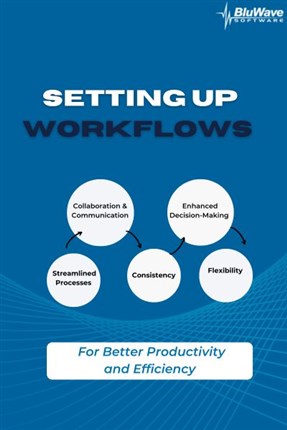
One of the most effective methods to achieve higher productivity and efficiency is by setting up well-defined workflows. Workflows streamline processes, eliminate redundancies, and ensure that tasks are completed systematically. Let’s explore why establishing workflows is crucial for your company and how it can significantly boost productivity and efficiency.
A workflow is a series of steps or tasks that are organized in a specific sequence to achieve a particular goal. Workflows can range from simple, linear processes to complex, multi-step procedures that involve multiple departments and team members. They serve as blueprints that guide employees through their tasks, ensuring consistency and standardization across the organization.
1. Streamlined Processes
Workflows help streamline processes by clearly defining each step and assigning responsibilities. This eliminates confusion and reduces the chances of errors, ensuring that tasks are completed efficiently. When everyone knows what they need to do and when to do it, the entire process becomes smoother and faster.
2. Improved Collaboration and Communication
Well-defined workflows enhance collaboration and communication among team members. By outlining each person's role and responsibilities, workflows ensure that everyone is on the same page. This reduces misunderstandings and fosters a collaborative work environment, where team members can easily coordinate and share information.
3. Consistency
Workflows bring consistency and standardization to your company's processes. By following a set of predefined steps, employees can perform tasks uniformly, reducing variations and ensuring quality. This is particularly important for tasks that require precision and accuracy, such as data entry or customer service.
4. Time and Resource Management
Effective workflows help manage time and resources more efficiently. By eliminating unnecessary steps and redundancies, workflows ensure that tasks are completed promptly without wasting valuable resources. This leads to faster turnaround times and more efficient use of manpower and materials.
5. Accountability and Transparency
Workflows create a sense of accountability among employees by clearly defining their roles and responsibilities. When each team member knows what is expected of them, they are more likely to take ownership of their tasks and deliver results. Additionally, workflows provide transparency by making it easy to track progress and identify bottlenecks, allowing for timely interventions and adjustments.
6. Enhanced Decision-Making
Workflows provide a structured approach to decision-making by outlining the steps and criteria for evaluating options. This ensures that decisions are made systematically, based on predefined guidelines, rather than on an ad-hoc basis. Structured decision-making processes lead to more informed and effective decisions, ultimately improving the overall performance of the company.
7. Scalability and Flexibility
Workflows are scalable and can be easily adapted to accommodate changes in the business environment. As your company grows and evolves, workflows can be modified to include new processes, departments, or technologies. This flexibility ensures that your company can continue to operate efficiently, even in the face of change.
Setting up workflows in your company is essential for enhancing productivity and efficiency. By streamlining processes, improving collaboration, and ensuring consistency, workflows can help your company achieve its goals more effectively. Invest in creating and maintaining well-defined workflows to reap the benefits of a more productive and efficient workplace.
![]()